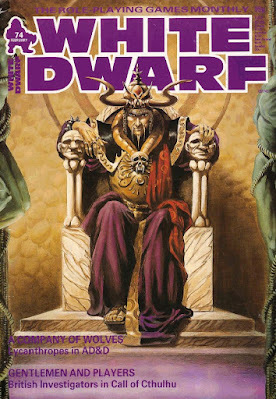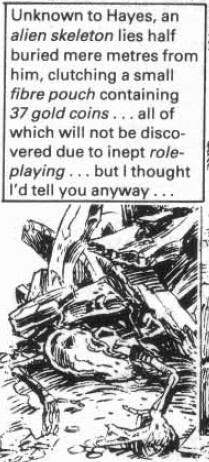White Dwarf: Issue #74
 Issue #74 of White Dwarf (February 1986) sports a cover by American conic book artist, Frank Brunner, who's probably best known for his work on Creepy, Eerie, and Vampirella, as well as his covers for Marvel's Savage Sword of Conan and Red Sonja. The issue also marks the point where Ian Livingstone hands over day-to-day editorial duties to Ian Marsh. Livingstone states that he is not "deserting the magazine" and will still "be keeping a benevolent eye on the progress of [his] eight-year-old love-child" in his new capacity as Editor-in-Chief. Despite his reassurances, this nevertheless feels like a turning point in the history of White Dwarf.
Issue #74 of White Dwarf (February 1986) sports a cover by American conic book artist, Frank Brunner, who's probably best known for his work on Creepy, Eerie, and Vampirella, as well as his covers for Marvel's Savage Sword of Conan and Red Sonja. The issue also marks the point where Ian Livingstone hands over day-to-day editorial duties to Ian Marsh. Livingstone states that he is not "deserting the magazine" and will still "be keeping a benevolent eye on the progress of [his] eight-year-old love-child" in his new capacity as Editor-in-Chief. Despite his reassurances, this nevertheless feels like a turning point in the history of White Dwarf.Case in point: the issue kicks off with "Superpower" by Bruce Hollands, which is an extensive look at the Games Workshop-published boardgame of the same name. Like the look at Warrior Knights from the previous issue, this article, while informative, nevertheless feels more like an extended advertisement for a GW product than a "real" article. That may be an unfair judgment on my part, but reading it convinced me that the oft-discussed transformation of White Dwarf into a full-on house organ of Games Workshop was not far in the future.
Countering that worry is "Open Box," which only reviewed one GW product this issue, the Call of Cthulhu scenario Night in Norway, which scores 7 out of 10. Also reviewed is Dragon Warriors and two of its supplements (The Way of Wizardry and The Elven Crystals), which collectively earn 9 out of 10. After all these years, I've still never read Dragon Warriors, which people whose opinions I respect tell me is well worth a look. The historical RuneQuest supplement Vikings gets 8 out of 10, while Oriental Adventures for AD&D receives 9 out of 10. The Pendragon Campaign, the predecessor to the well regarded The Boy King, is similarly well regarded, earning 9 out of 10. The column wraps up with a look at two different scenarios for use with FASA's Star Trek , The Outcasts and Termination 1456, both of which are judged perfect (10 out of 10).
Dave Langford's "Critical Mass" generally vexes me, but this issue's column at least looks at a few books I know and have read, like Jack Vance's Planet of Adventure series. Langford quite correctly recognizes the value of these books and of Vance more generally
The good stuff lies in Tschai's rich scents and colours, and in elaboration of style. No Vance villain would say 'I'll get you for that.' Instead: 'Low-grade assassins will drown you in cattle excrement! Twenty pariahs will drub your corpse! A cur will drag your head along the street by your tongue!'
Langford's byline reappears under "The Power of the Frog," a science fiction short story about a human junior military officer held prisoner by an alien race. Like all of Langford's previous short stories, this one is both brief and amusing. It's clear the man has talent, which is why I sometimes feel bad at the lack of interest his book review column elicits. Truthfully, I wish he had contributed more fiction to White Dwarf.
"Terror at Trollmarsh" is an AD&D adventure for 4th–5th-level characters by Peter and Janet Vialls. I really enjoyed this one, which takes the form of a murder mystery with fantasy/horror elements. A monster is stalking the halls of Baron Uther Torgrim, killing his servants, and it's up to the players to figure out just what is really going on. While the overall concept is a standard, even clichéd one, the authors handle it well, giving the referee an interesting, well mapped out environment, an array of compelling NPCs, and a culprit with clear, understandable motives. "Terror at Trollmarsh" is nothing revolutionary, but, like all good scenarios, it gives players lots of "moving parts" with which to interact as they grapple with its central mystery.
"A Company of Wolves" by Peter Blanchard looks at lycanthropy in AD&D from both a game and folkloric perspective. The article doesn't offer much in the way of new rules mechanics, which I appreciate, focusing instead on "social" aspects of this magical curse, which is to say, how it might function in a fantasy setting, including its advantages and drawbacks. "The Hide of the Ancestor" by Chris Watson is a short RuneQuest scenario about the recovery of a relic holy to the twenty-six tribes of the Ithillian-Fane, a race of lion-centaurs. I find it oddly refreshing to read a RQ adventure set in Glorantha whose author feels comfortable enough with the setting to his own creations, like the Ithillian-Fane to it. Too often settings like Glorantha – and Tékumel and Hârn and ... – are treated as inviolable to the point that no one is even willing to play in them, lest they "do it wrong." That's nonsense in my opinion, which is why I delight in scenarios like "The Hide of the Ancestor."
"Gentlemen and Players" by Richard Edwards and Chris Elliott is nice little article about creating British characters for use with Call of Cthulhu. As its title suggests, the article focuses on the creation of "gentlemen" (or aristocratic amateurs) and "players" (professional sportsmen). "Hitting the Right Note" by Ian Berridge presents information on musical instruments, their use, and the how to learn to play them for use with AD&D. Articles like this are godsends to those whose campaigns would benefit from such fine details – and absolutely useless to those whose campaigns wouldn't.
"Alternative Origins" by Ian Thomson is a collection of random tables for use with Games Workshop's Golden Heroes. The tables are intended to replace those presented in the game for character generation in order to produce more "convincing" heroes whose powers are an incompatible jumble. This makes good sense to me, but then I haven't looked at a copy of Golden Heroes in decades, so it's hard for me to judge how useful this article would be. Elsewhere, Joe Dever offers part three of his look at "Dioramas," accompanied by some lovely – though non-diorama – photographs of painted miniatures.
The issue also includes more "Thrud the Barbarian," a full-page "Gobbledigook," and "The Travellers," which continues its Shadows-inspired plotline. I particularly enjoyed the latter, especially this bit:
 Of course, I've always been fond of the way that "The Travellers" blends Traveller-specific humor with more general lampoonery of roleplaying games, so I may be biased. In any case, it's nice to see that one of my favorite comics remains as amusing ever, even if White Dwarf as a whole looks to be on the verge of some monumental – and not entirely pleasing – changes.
Of course, I've always been fond of the way that "The Travellers" blends Traveller-specific humor with more general lampoonery of roleplaying games, so I may be biased. In any case, it's nice to see that one of my favorite comics remains as amusing ever, even if White Dwarf as a whole looks to be on the verge of some monumental – and not entirely pleasing – changes.
James Maliszewski's Blog
- James Maliszewski's profile
- 3 followers



